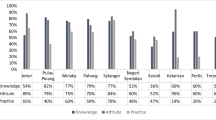Abstract
Livestock diseases and other animal health events are a threat to achieving sustainable livestock industry. The knowledge of trace-back and the practice of providing feedback on diseases encountered in slaughtered animals from the abattoir to the farm can help limit the spread as well as manage potential future incidents of such diseases. We assessed the knowledge, attitudes and practices of 200 willing livestock traders on traceability in Bodija Municipal Abattoir, south-western Nigeria. The results reveal that the majority of these traders had poor knowledge (79.5 %) and practices (74.0 %) of traceability, though 89.5 % demonstrated good attitudes. While 22.9 % knew that traceability could be an effective means to control diseases, only a lower proportion (9.0 %) knew the health status of the animals being purchased. Though 29.0 % reported the diseases encountered in their animals during slaughter to the farm, only 9.5 % followed up to ensure the farmers take steps at preventing further occurrence of the reported diseases. While age (p = 0.000; 0.014) and education (p = 0.000; 0.000) were both significant for good knowledge and attitudes, frequency of condemned cases (p = 0.000) and length of years in the trade (p = 0.004) were, respectively, significant for good knowledge and attitudes with none associated with practice. These poor levels of knowledge and practices of traceability are a threat to sustainable livestock industry, food security and human health; hence, there is an urgent need to institute national feedback mechanism on slaughtered animals in order to strengthen interventions against diseases at farm levels.
Similar content being viewed by others
References
Adesokan, H.K., Jenkins, A.O., van Soolingen, D., Cadmus, S.I.B., 2012. Mycobacterium bovis infection in livestock workers in Ibadan, Nigeria: evidence of occupational exposure. International Journal of Tuberculosis and Lung Disease, 16(10), 1388–1392.
Cadmus, S.I.B., Adesokan, H.K., 2009. Causes and implications of bovine organs/offal condemnations in some abattoirs in Western Nigeria. Tropical Animal Health and Production, 41, 1455–1463.
Cardoso, L.A., 2012. Environmental and economic impacts of livestock productivity increase in sub-Saharan Africa. Tropical Animal Health and Production, 44, 1879–1884.
Food and Agriculture Organization, 2011. Fourth report of the global programme for the prevention and control of highly pathogenic avian influenza. In: http://www.fao.org/docrep/014/i2252e/i2252e00. Accessed 10 Jan 2013
Haghiri, M., 2011. Advances in traceability system: consumer attitudes toward development of an integration method and quality control systems for the farmed Atlantic salmon. In: https://www.ifama.org/events/conferences/2011/cmsdocs/2011SymposiumDocs/236_Symposium%20Paper.pdf. Accessed 7 August 2013
Hu, J.I., 2013. Development of gap and traceability system for greening the food chain in Taiwan. In: http://www.agnet.org/library/eb/592/. Accessed 7 August 2013
Institute of Food Technologists, 2013. Global food Traceability Center Concept Paper. In: http://www.ift.org/traceability. Accessed 7 August 2013
Kotsiri, S., Rejesus, R., Marra, M., Velandia, M., 2011. Farmers’ perceptions about spatial yield variability and precision farming technology adoption: an empirical study of cotton production in 12 Southeastern States. In: Selected paper prepared for presentation at the Southern Agricultural Economics Association, Annual Meeting, Corpus Christi, TX. http://ageconsearch.umn.edu/bitstream/98689/2/SAEA11_final_.pdf. Accessed 15 February 2013
Perry, B.D., Grace, D., 2009. The impacts of livestock diseases and their control on growth and development processes that are pro-poor. Philosophical Transactions of the Royal Society B, 364, 2643–2655.
Rich, K.M., Perry, B.D., 2011. The economic and poverty impacts of animal diseases in developing countries: new roles, new demands for economics and epidemiology. Preventive Veterinary Medicine, 101(3–4), 133–147.
Schiefer, G., 2008. Tracing and tracking—a challenge for system organization and IT. Journal of Information Technology in Agriculture, 3, 19–25.
Toto, A., 2010. Benefits of investing in animal identification and traceability - Namibia. In: EU Veterinary Week: Conference on identification and traceability along the food chain, Brussels, 2010. http://ec.europa.eu/food/animal/diseases/strategy/docs/AlexanderToto.pdf Accessed 7 August 2013
Wahab, B., 2011. Ibadan: a rapidly growing city in need of a Master Plan. Paper read at the Architects’ Congress/Annual General Meeting organized by the Nigerian Institute of Architects, Oyo State Chapter, held at Penrose Event Centre, Obafemi Awolowo Avenue, Old Bodija Estate, Ibadan, July 7. http://socsc.ui.edu.ng/WBWahab. Accessed 22 August 2013\
Xu, L., Shan, L., Wu, L., 2012. Farmers’ adoption willingness of food traceability system: an empirical analysis of the Chinese apple industry. Journal of Food, Agriculture and Environment, 10 (3&4), 1581–1584.
Yali, F., Xiumin, W., Xiaofeng, L., 2011. Analyses on the willingness and the influence factors of the provider to establish the livestock products traceability system – take Chengdu for example. International Business Management, 5 (3), 173–177.
Zhang, C., Bai, J., Wahl, T.I., 2012. Consumers’ willingness to pay for traceable pork, milk, and cooking oil in Nanjing, China. Food Control, 27, 21–28.
Acknowledgements
The author thanked the livestock traders who offered to participate in this study.
Conflict of interest
The authors declare that they have no conflict of interest.
Author information
Authors and Affiliations
Corresponding author
Rights and permissions
About this article
Cite this article
Adesokan, H.K., Ocheja, S.E. Knowledge, attitudes and practices of traceability among livestock traders in south-western Nigeria: implications for sustainable livestock industry. Trop Anim Health Prod 46, 159–165 (2014). https://doi.org/10.1007/s11250-013-0467-3
Accepted:
Published:
Issue Date:
DOI: https://doi.org/10.1007/s11250-013-0467-3




